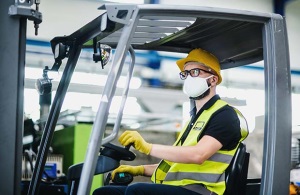Forklift news
The largest forklift operator training website in the world

![]()
![]()
Complete Instructor's training slide set, 130 slides, £50
Forklift training. Lessons learned from the pandemic so far

A year into the COVID-19 pandemic, RTITB shares its learnings around lift truck training, what has changed, and how supply chain organisations are preparing for the future.
“In a short time, COVID-19 disrupted the world, and the world of work, but the effects of the pandemic on the supply chain are ongoing,” says Laura Nelson, Managing Director for RTITB, the UK’s leading workplace transport training accrediting body. “12 months in we’ve seen some big differences in how businesses are looking to fulfil their lift truck operator training needs as a result.”
From November 2020 to January 2021, RTITB saw an increase in enquiries of 130% for in-house RTITB Accreditation – more than double compared to the same period the previous year. In particular, RTITB reports that more warehousing and food manufacturing organisations have looked to become RTITB Accredited in their own right, rather than relying on outsourcing training.
“This move seems to be driven by a desire for self-sufficiency,” explains Laura. “Many of the organisations we have dealt with were doing all the right things in terms of lift truck operator training, but simply want to deliver it themselves now with an in-house instructor, rather than outsourcing it.”
In fact, 38% of existing RTITB Accredited sites are now training their own employees, rather than using commercial providers – an increase from less than 25% just 18 months ago. Key factors driving this change may include greater flexibility, with access to training at times that suit the business and operator’s shift patterns. Plus, the desire to tailor training more to their particular business and policies, rather than using ‘open courses’ in a training centre which are intentionally designed to have mass appeal.
However, RTITB states that it is important to remember that the in-house route won’t be right for everyone.
“In many cases, RTITB Accredited Training Providers still add enormous value, bringing outside perspectives and vast experience to businesses, alongside the ability to deliver high quality, standardised training that is also COVID-secure,” says Laura. “To reduce COVID-19 risks, many have also completed our free eLearning course Managing COVID Risk During Lift Truck Training.”
However, in-house RTITB Accreditation also appeals to some organisations as it provides a means to easily train occasional users and agency workers without needing to bring in an external trainer. Due to isolating and shielding this ‘ad hoc’ lift truck training has been a more common requirement for businesses but could prove costly where the course is for just one operator. Yet this type of training is completely essential for businesses to be able to cope with peaks.
“As demand spiked during COVID-19, a lot of businesses needed lift truck operator training at the same time to get additional workers up and running,” says Laura. “Training Providers have done an amazing job in helping to keep the supply chain moving during the pandemic, but, in some circumstances, there were unavoidable delays for customers.”
To learn more about RTITB Accreditation for organisations delivering in-house lift truck training, or the wide range of affordable RTITB Accreditation options for Training Providers, visit www.rtitb.com, email solutions@rtitb.com or call 01952 520203.